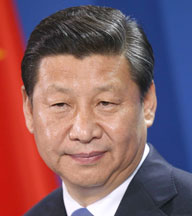|
China's New Silk Road into Europe:
Combining commerce with politics
By Keith Johnson
China is actively building out the European portion of its ambitious
new "Silk Road" plan, with port deals from Greece to the Netherlands,
railroad investments in Greece, Serbia and Hungary, and a handful of
historic, high-profile state visits this spring by President Xi Jinping.
 |
|
Chinese President Xi
Jinping (ncmp) |
Beijing's multibillion-dollar plans to build overland and maritime
links across Central and South Asia - whether that means huge
investments in Pakistan or gas pipeline deals in places like Kazakhstan
and Uzbekistan - grab the lion's share of attention. But the ultimate
prize in the Silk Road plan - also known in China as the "One Belt, One
Road" initiative - is someplace else: Europe.
That's true both because Europe represents a bigger and richer market
than the relatively poor countries that dot the steppe, and because
Beijing's ambitions aren't purely commercial.
Geo-political project
"It is not an economic project, it is a geopolitical project - and it
is very strategic," said Nadège Rolland, an analyst at the National
Bureau for Asian Research. As it has across Asia, Africa and Latin
America, China is trying to parlay its economic heft into bigger
diplomatic influence in Europe.
That task is made easier, thanks to the increasing weight and reach
of Chinese state-owned companies. Beijing began encouraging
consolidation among competing firms last year as a way of trying to deal
with overcapacity in Chinese industry, where having several giant firms
in the same sector was leading to inefficiencies.
The resulting mergers created giants like such as CRRC Corporation,
formerly a pair of railroad equipment makers and now the world's
second-biggest industrial company, and COSCO, cobbled together from a
pair of state-owned shipping firms and now the world's fourth-largest
shipping company. Both of those mega-firms are active in China's recent
European investments.
COSCO is snapping up stakes in ports, while CRRC is working to build
new rail lines in Eastern Europe. Another state-owned giant, ChemChina,
has been on a European buying spree in the last year, gobbling up
agricultural firms, tire makers and machine tool manufacturers. And
their state-backed involvement makes clear that more is at stake than
the financial bottom line.
"Most Chinese foreign direct investments are not normal foreign
direct investments," said Philippe Le Corre of the Brookings
Institution, co-author of the recently published book, China's Offensive
in Europe. "With a few exceptions, they just happen to have the whole
Chinese state behind them."
In Europe, China's investment push has indeed led to a few diplomatic
victories. Fuelled by big investments in the energy sector, Xi received
red-carpet treatment from British leaders on a state visit last year.
Several of Europe's biggest countries, including the UK, France,
Germany and Italy, supported China's creation of a new international
development bank, the Asian Infrastructure Investment Bank.
China is perhaps making its biggest inroads on Europe's periphery. It
has created a new grouping, known as the "16+1," of the 16 Central and
Eastern European countries including some inside and some outside the
European Union. The informal club has responded to Chinese
infrastructure investment with closer ties and a more compliant approach
to issues that are prickly for Beijing, especially human rights.
The Czech Republic, once outspoken on the subject of Tibetan
independence, now hews closer to Beijing's line regarding its continued
control of the Himalayan nation. Beijing hailed Slovenia as one of a
group of 40 countries.
In Europe, China's geopolitical ambitions have run into growing
opposition, both in the street and among some governments.
Earlier this month, the European Parliament recommended against
granting China "market economy status," a label Beijing craves and which
it believes it is entitled to 15 years after joining the World Trade
Organization. The EU reticence is driven, in part, by concerns of
continued unfair Chinese competition, including "dumping" the detritus
of its industrial overcapacity in Europe, which makes life more
difficult for struggling European firms.
Growing footprint
Europe has also begun to push back against China's territorial
ambitions in the South China Sea. Slovenia made clear, in contrast to
Beijing's public pronouncements, that it does not take sides on the
dispute.
In April, France signed a US$40 billion deal to build advanced new
submarines for Australia, prompted by French concerns about Chinese
military expansion in the Western Pacific. More recently, Britain urged
all countries including China to respect an upcoming ruling by an
international arbitration panel on the South China Seas imbroglio.
Beijing has attacked the tribunal's legitimacy and vowed to ignore
whatever ruling it hands down.
"The European part of One Belt, One Road will not be a walk in the
park," said Le Corre. "It's not that simple to say, 'China is going to
come and rescue Europe.' I don't think there's appetite for this."
- Foreign Policy |

